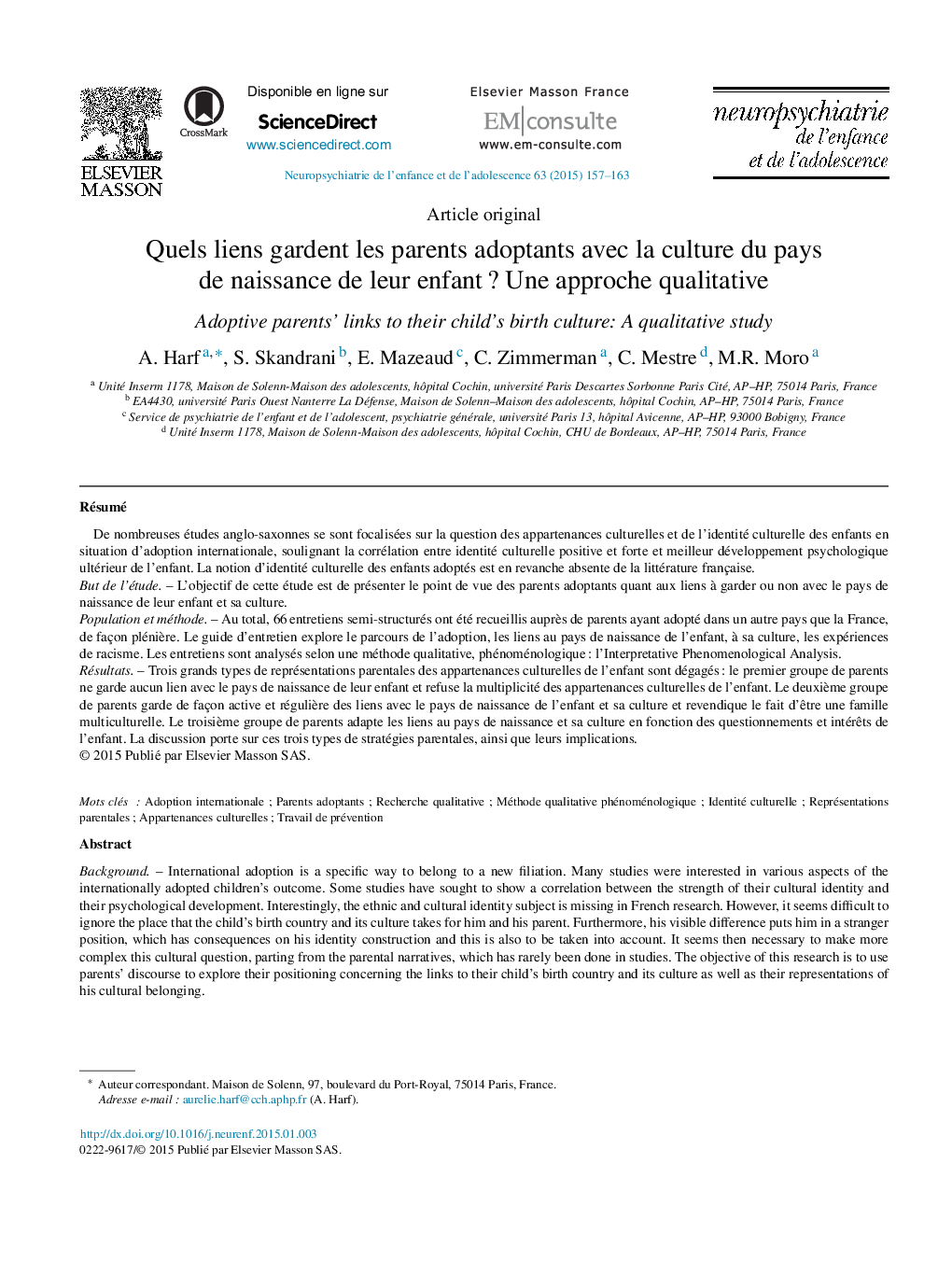| کد مقاله | کد نشریه | سال انتشار | مقاله انگلیسی | نسخه تمام متن |
|---|---|---|---|---|
| 943853 | 925565 | 2015 | 7 صفحه PDF | دانلود رایگان |
RésuméDe nombreuses études anglo-saxonnes se sont focalisées sur la question des appartenances culturelles et de l’identité culturelle des enfants en situation d’adoption internationale, soulignant la corrélation entre identité culturelle positive et forte et meilleur développement psychologique ultérieur de l’enfant. La notion d’identité culturelle des enfants adoptés est en revanche absente de la littérature française.But de l’étudeL’objectif de cette étude est de présenter le point de vue des parents adoptants quant aux liens à garder ou non avec le pays de naissance de leur enfant et sa culture.Population et méthodeAu total, 66 entretiens semi-structurés ont été recueillis auprès de parents ayant adopté dans un autre pays que la France, de façon plénière. Le guide d’entretien explore le parcours de l’adoption, les liens au pays de naissance de l’enfant, à sa culture, les expériences de racisme. Les entretiens sont analysés selon une méthode qualitative, phénoménologique : l’Interpretative Phenomenological Analysis.RésultatsTrois grands types de représentations parentales des appartenances culturelles de l’enfant sont dégagés : le premier groupe de parents ne garde aucun lien avec le pays de naissance de leur enfant et refuse la multiplicité des appartenances culturelles de l’enfant. Le deuxième groupe de parents garde de façon active et régulière des liens avec le pays de naissance de l’enfant et sa culture et revendique le fait d’être une famille multiculturelle. Le troisième groupe de parents adapte les liens au pays de naissance et sa culture en fonction des questionnements et intérêts de l’enfant. La discussion porte sur ces trois types de stratégies parentales, ainsi que leurs implications.
BackgroundInternational adoption is a specific way to belong to a new filiation. Many studies were interested in various aspects of the internationally adopted children's outcome. Some studies have sought to show a correlation between the strength of their cultural identity and their psychological development. Interestingly, the ethnic and cultural identity subject is missing in French research. However, it seems difficult to ignore the place that the child's birth country and its culture takes for him and his parent. Furthermore, his visible difference puts him in a stranger position, which has consequences on his identity construction and this is also to be taken into account. It seems then necessary to make more complex this cultural question, parting from the parental narratives, which has rarely been done in studies. The objective of this research is to use parents’ discourse to explore their positioning concerning the links to their child's birth country and its culture as well as their representations of his cultural belonging.MethodThe study includes 51 French parents who adopted one or more children internationally. Each parent participated in a semi-structured interview. The broad topics covered included the adoption procedure, the choice of country, the trip to the child's native country, the child's history before adoption, the current associations with the child's birth country, the experiences of racism and discrimination. The sample includes 66 semi-structured interviews. The interviews were analyzed according to a qualitative phenomenological method, Interpretative Phenomenological Analysis.ResultsThe interviews phenomenological analysis aims at describing three different parental representations of the child's cultural belonging. The first group maintained no association with the child's country of birth and refused any multiplicity of cultural identities. The second group actively maintained regular associations with the child's country of birth and culture and asserted their family's multicultural belonging. Finally, the third group adapted their associations with the child's country of birth and its culture according to the child's questions and interests.PerspectiveExploring parental representations of the adopted child's cultural belonging enables professionals involved in adoption to provide better support to these families and to do preventive work at the level of family interactions.
Journal: Neuropsychiatrie de l'Enfance et de l'Adolescence - Volume 63, Issue 3, May 2015, Pages 157–163
